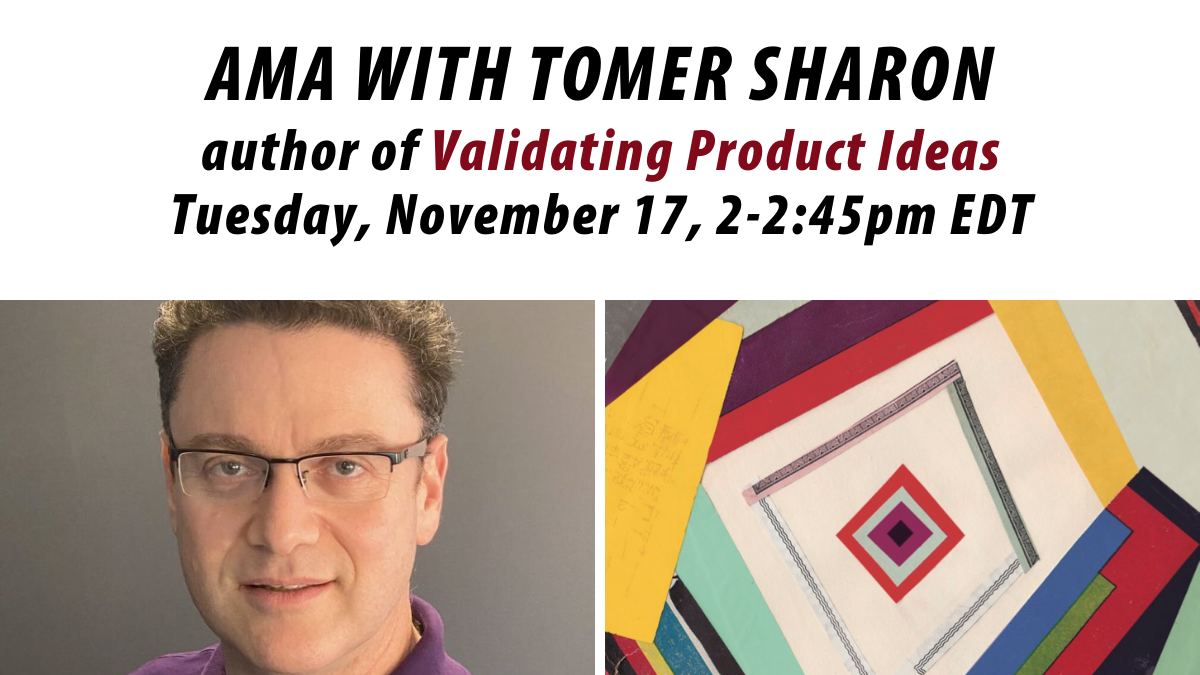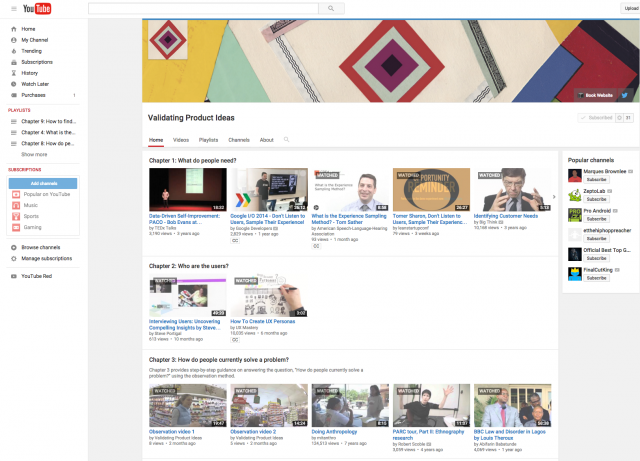-
Recap: AMA with author Tomer Sharon
Posted on
 During our “Ask Me Anything” with Tomer Sharon, author of Validating Product Ideas, we touched on subjects ranging from product testing, to lean UX and how to change a company’s perspective on how to do usability testing. Read on for a recap of the session, and please join our Slack here to stay informed about when our next #rm-chat author AMA will be!
During our “Ask Me Anything” with Tomer Sharon, author of Validating Product Ideas, we touched on subjects ranging from product testing, to lean UX and how to change a company’s perspective on how to do usability testing. Read on for a recap of the session, and please join our Slack here to stay informed about when our next #rm-chat author AMA will be!
Q: What are your thoughts on adding more features to an already somewhat complicated tool that there is potentially not much helpful use out (according to past studies) but is something the higher up’s have said needs to be implemented. I was thinking of doing some prototyping and having interviews with users to see how they interact with addition to help potentially build a case for potentially not adding the feature. I personally think based on my research, they’re not addressing the root use – but the symptom of a larger issue.
A: Proceed with care, but if you are trying to make a point to higher ups, consider running a usability test with them as participants. Sometimes they need to literally be put in their users’ shoes to understand the effect of their requests and decisions. I tried it once and it worked like magic. But I can see how it can go south. If you have data to back up your recommendation, that helps.
Q: I’m wondering what you would recommend for starting out with sharing atomic insights with teams that are more familiar with traditional decks or reports? I would love to start developing and leveraging a research repository, but I’ve been asked to demonstrate a proof of concept using our existing software suites (i.e. Microsoft).
A: I would argue they are eager to get answers to their questions and that the format/tool is less critical. Sway the discussion away from the tool to the essence.
Q: What are some books you’re currently reading that you’d like to shout out?
A: When I read, I always read several books simultaneously. I’m now reading these:
- Thinking in Systems: A Primer
- Little Red Book of Selling: 12.5 Principles of Sales Greatness
- Writing That Works; How to Communicate Effectively In Business
- Atomic Habits: An Easy & Proven Way to Build Good Habits & Break Bad Ones
Q: What have you found to be most persuasive in convincing a team to invest in getting a pulse on competitive research insights?
A: Your best success in persuading people will be to convince them about something they are already invested in. Start with their questions; what do they want to know? Why? What is the knowledge gap? Once you identify it, answer the questions and fill the gap with knowledge. If the gap is about competitive research insights, so be it.
Q: As a UX’er who wears many different hats, do you have any advice on how to reduce fear or anxiety from others who may think you’re overstepping when trying to validate ideas – when you’re really just trying to complete a project that was given to you by your boss? In my case, I’m not a manager but an internal consultant – and as I get more high priority/impact projects – my boss expects me to ask these difficult questions. I’m sensing a bit of annoyance and animosity from those I was originally close with. I’ve explained that I’m there to understand and work with them to improve where necessary and that we’re a team who impact thousands of users so working together to deliver a validate product is really important.
A: It sounds as if you are doing the right thing. My advice is to continue communicating with people directly and openly. Talk with people, not about them.
Q: For a new product, what questions are you typically using to validate interest vs. likelihood to purchase vs. likelihood loyalty?
A: I don’t. I am not interested in questions about the future. I am interested in problems of the present and recent past, motivations, and behaviors. What people tell us about their future interest and behavior is not trustworthy. Not because they lie to us, but because they have no way of correctly predicting their future behavior. Especially in a research situation, when people want to be perceived as helpful, smart, and friendly.
Q: I’ve just started working as a first user researcher in a company where designers and product managers are doing the research. I am not supposed to replace them, I should be leveling up their research capabilities and start with reops stuff. I was told they were doing lots of discovery but soon realized it’s all about usability testing. It seems to me the it comes from Marty Cagan’s book Inspired (simplification to discovery and delivery). The book is the company’s bible and I am not sure how to approach the change of the mindset so that we can do more exploratory research.
A: If they already do usability testing, that’s a great start. I would recommend you run one such usability test (off to help someone who is stressed out in time) and dedicate some of it to traditional usability testing and the rest to exploratory research. My experience is that at first they won’t understand why you do that, and then they’ll be more interested in that than the usability test.
Q: Are there any successful Lean approaches at regulated organizations (e.g. financial services, healthcare, etc.) where you can’t just experiment and measure live as some Lean UX methods advocate?
A: Yes, experimenting in heavily regulated companies is hard. But if there’s a will, there’s a way. Might take a lot of time and effort to make it happen but it’s doable. If Goldman Sachs did it, anyone can. Trust me…
AMA with Tomer Sharon, Author of Validating Product Ideas
Posted on
Join us on Slack for an “Ask Me Anything” with Tomer Sharon, author of Validating Product Ideas. He’ll be answering your questions live on Tuesday, November 17 from 2-2:45pm EDT in our #rm-chat channel. Join our Slack here.

The book’s YouTube channel
Posted on
Validating Product Ideas’ YouTube channel begins to take shape & form. Subscribe!
My interview with Brad Feld on Empathy
Posted on
Listen to my 15-minute interview with Brad Feld (@bfeld) on empathy. Interview prepared by Daniel Szuc of Apogee Hong Kong (apogeehk.com) and yours truly. Full transcript available in the description. Let us know what you think!
My interview with Gary Vaynerchuk on empathy
Posted on
Listen to my 15-minute interview with Gary Vaynerchuk (@garyvee) on empathy. Interview prepared by Daniel Szuc of Apogee Hong Kong (apogeehk.com) and yours truly. Full transcript available in the description. Let us know what you think!
New Yorkers: “Validating Assumptions with Lean User Research” workshop
Posted on
“Validating Assumptions with Lean UX Research”, my full-day workshop is on Saturday, 10/25, 10am-6pm, at General Assembly NYC. During the workshop you’ll learn and practice Experience Sampling, Interviewing, and Field Observation to answer a real-life research question.
No pre-requisites. The workshop is for product managers, startup founders, entrepreneurs and aspired entrepreneurs, marketers, biz devs, designers, researchers, you, you, and you.
Seats are limited. Sign up quickly here: https://generalassemb.ly/education/validating-assumptions-with-lean-ux-research/new-york-city/8146
Monthly Lean User Research Email Update
Posted on
Interested in a monthly update of lean user research resources, articles, videos, talks, and training announcements? [This was the first update]
Google I/O 2014: Perfectly Executing The Wrong Plan
Posted on
This is my Google I/O 2014 talk from last Wednesday.
Description:
App developers ask themselves excellent questions about their users: Do people need my app? Can people use my app? Why do people sign up and then not use my app? However, app developers answer their excellent questions in invalid and unreliable ways. It is shocking to see how much effort app developers put in writing elegantly structured, refactored code, with good unit test coverage in an agile environment, and yet, their apps fail miserably.This talk will inspire developers to implement valid and reliable ways to answer their most burning questions. It’ll help them validate or invalidate their assumptions on their own—cheaply, and quickly, by using simple user research techniques with a main goal in mind: developing apps people need, want, and enjoy.
First 30 minutes are the talk itself, the rest is Q&A.
[iframe width=”560″ height=”315″ src=”//www.youtube.com/embed/9TJTbRw4ri8″ frameborder=”0″ allowfullscreen></iframe]
Flying Cars, User Research, Attitude, and Behavior
Posted on
Watch my 24-minute Google for Entrepreneurs video class. Excellent for people who tend to ask others what they think about their startup idea.
[iframe width=”560″ height=”315″ src=”//www.youtube.com/embed/KlSgWT2Nbak” frameborder=”0″ allowfullscreen> My Google for Entrepreneurs video class
Female startup founder or investor? Help me with my book!
Posted on
My name is Tomer Sharon and I am a Senior User Experience Researcher at Google Search in New York City. I am also the author of the book, It’s Our Research: Getting stakeholder buy-in for user experience research projects (2012). I’m currently working on a new book, Lean User Research for Product Development, and I would like to ask for 10 minutes of your time to help with research for this book. My current research includes oh-too-many male respondents and I am eager to balance things to get better data.
The book is for practitioners who take part in product development and don’t have too much training in, time, or budget for UX research. I teach my readers how to learn from their users quickly, cheaply, on their own. I provide step-by-step guidance through answering their most burning questions about their users with far-from-robust, quick-and-dirty research techniques anyone can apply.
***Female startup founders***: I would like to ask you a few questions about your startup and approach to customers. My goal here is learning from you. My intention is not in any way to judge the way you work or what you believe in. If you respond to the following questionnaire, you will be given credit as one of my book’s co-creators, if you’d like. If not, you can remain anonymous and all I’ll mention is that I spoke with a startup founder from <City, State, Country>.
Startup founders: please complete this questionnaire
***Female investors***: I would like to ask you a few questions about customer development among startups. It is important for me to say that my only intention is to learn from you toward a book I am currently writing. My intention is not in any way to judge the way you work or what you believe in. If you respond to the following questionnaire, you will be given credit as one of my book’s co-creators, if you’d like. If not, you can remain anonymous and all I’ll mention is that I spoke with a startup founder from <City, State, Country>.
Female investors: please complete this questionnaire
Please help me get the right data for my book.
Thank you so much!
